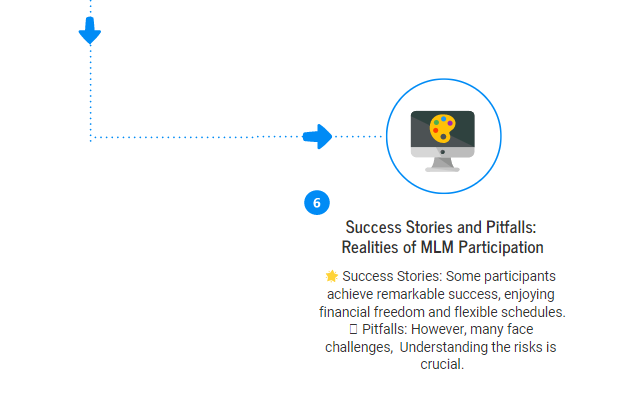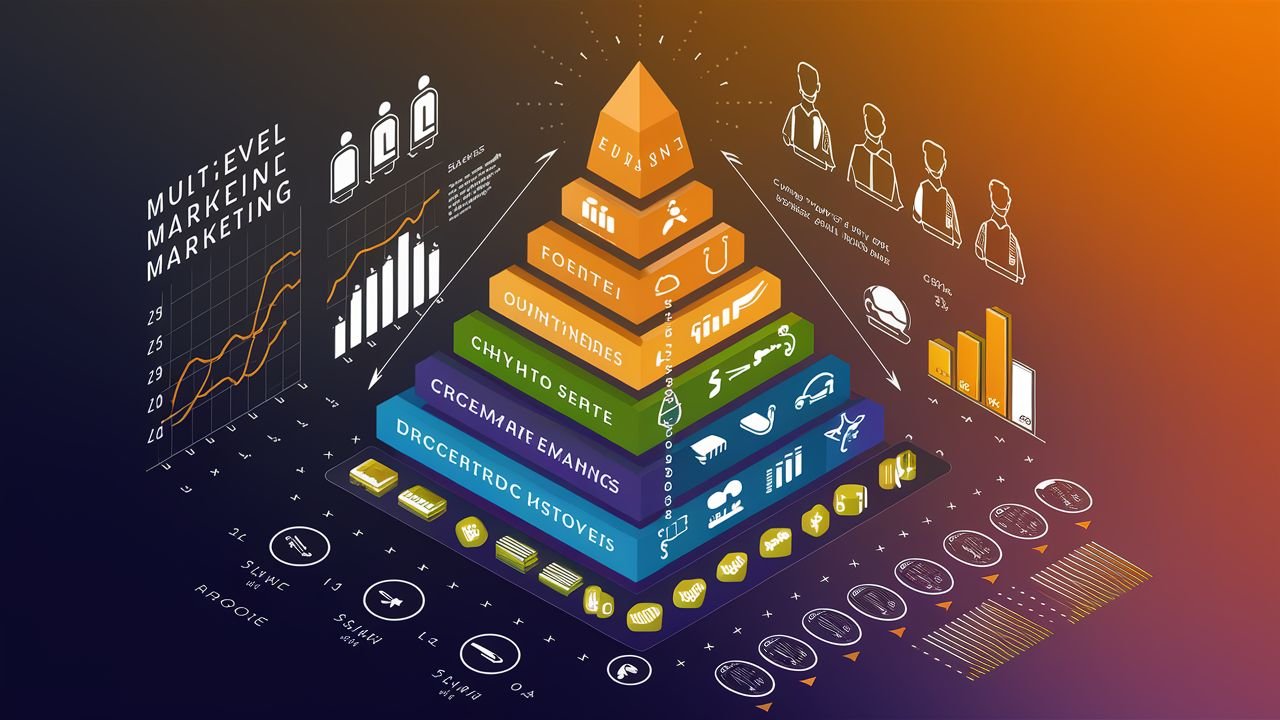




Multilevel marketing (MLM) stands as a business approach employing a network of ordinary individuals to promote and distribute various products and services. In contrast to traditional retail outlets, MLM companies utilize people-centric structures for product sales, placing the onus of selling on independent distributor networks.
Within the MLM framework, distributors operate as distinct business owners rather than being classified as company employees. Their role involves not only selling products but also recruiting their own networks of distributors to facilitate sales. The revenue generation for MLM firms heavily relies on this expansive network of independent distributors. Rather than opting for conventional retail spaces, these companies provide individuals with a platform to establish their own “businesses,” earning commissions. Furthermore, recruiting others into the business results in earning a percentage of their sales, creating a cascading effect known as a downline. As individuals progress along this chain, they are offered incentives such as vacations, cars, and other perks for achieving various sales levels.
Multilevel marketing enterprises often face skepticism due to negative reviews from both customers and distributors, the latter being individuals engaged in selling the products and often known as representatives or consultants. While it is not imperative to dismiss all MLM opportunities outright, engaging in thorough research is crucial to making informed decisions about involvement with any particular network marketing business.

Let’s consider a company called “HealthLife,” which sells health and wellness products. HealthLife uses a binary compensation plan, one of the common MLM structures.
HealthLife Binary Compensation Plan :
Recruitment :
Members join HealthLife by purchasing a starter kit for $100.
Each member is encouraged to recruit two new members (left leg and right leg) to build a binary structure.
Personal Sales Commission :
Members earn a 20% commission on their personal sales.
Example: If a member sells $500 worth of products, they earn $100 (20% of $500).
Binary Team Commissions :
As members recruit, they build a binary tree structure.
Members earn a percentage of the sales volume from their weaker leg (the leg with fewer sales).
Suppose the weaker leg generates $5,000 in sales and the stronger leg generates $8,000. If the commission rate is 10%, the member earns $500 (10% of $5,000).
Matching Bonus :
Members can earn a matching bonus on the binary commissions of their personally sponsored members.
For example, if a personally sponsored member earns $500 in binary commissions, the sponsoring member might earn a 20% matching bonus, earning them an additional $100.
Leadership Bonus :
Achieving higher ranks within the MLM structure can unlock leadership bonuses.
For instance, a “Diamond” rank might earn an extra 2% on the binary commissions of the entire team.
Example Scenario:
John joins HealthLife and recruits Alice and Bob.
John’s left leg (Alice) generates $6,000 in sales, and his right leg (Bob) generates $8,000.
John’s personal sales are $2,000.
Earnings :
Personal Sales Commission : $400 (20% of $2,000)
Binary Team Commission : $600 (10% of $6,000 from the weaker leg)
Matching Bonus : If Alice earns $500, John might earn a 20% matching bonus, which is an additional $100.
In this example, John’s total earnings for the period would be $1,100.

Pyramid schemes and multi-level marketing (MLM) are two business models that often get confused due to their similarities, yet they have distinct differences. Understanding these differences is crucial for individuals considering involvement in such ventures or seeking to distinguish between legitimate business opportunities and potential scams.
Pyramid Scheme:
A pyramid scheme is an illegal and fraudulent business model that primarily relies on recruiting participants rather than selling actual products or services. The structure resembles a pyramid, with a single person or a few individuals at the top, recruiting a layer of participants beneath them. Each new recruit is required to pay a fee, which then goes to the person who recruited them. The process repeats, and participants are promised high returns for recruiting more people into the scheme.
Pyramid schemes are unsustainable in the long run because they require an ever-increasing number of recruits to continue generating revenue. Eventually, the pyramid collapses, and those at the bottom lose their investments. Authorities worldwide actively work to identify and shut down pyramid schemes to protect consumers.
Multi-Level Marketing (MLM):
Multilevel marketing, on the other hand, is a legitimate business model where products or services are sold through a network of distributors. In MLM, participants earn commissions not only for their sales but also for the sales made by the individuals they recruit into the network. This creates a multi-level structure, hence the name.

Product or Service Focus:
Legitimate MLM companies emphasize the sale of actual products or services, rather than relying solely on recruitment.
Legal Compliance:
MLM companies operate within the bounds of the law, following regulations and guidelines set by relevant authorities.
Sustainable Structure:
Unlike pyramid schemes, MLMs are designed to be sustainable, with an emphasis on product sales contributing to the revenue.
While MLMs have faced criticism for aspects such as aggressive recruitment tactics and the potential for participants to lose money, they are not inherently illegal. Several well-known companies operate under the MLM model and have successfully established themselves in the market.
In summary, the primary distinction between pyramid schemes and Multilevel marketing lies in their fundamental purpose and legality. Pyramid schemes are fraudulent, unsustainable models based on recruitment, while MLMs are legal business structures that involve selling actual products or services through a network of distributors. It is essential for individuals to thoroughly research any business opportunity before getting involved to ensure legitimacy and legality.

Multi-Level Marketing (MLM) is a business model that relies on a hierarchical network of distributors to sell products or services. Participants earn income not only from their direct sales but also from the sales made by the distributors they recruit into the network. While Multilevel marketing have been both praised for their potential to offer flexible business opportunities and criticized for their resemblance to pyramid schemes, one common guideline often discussed within the MLM community is the “70% Rule.”
The 70% Rule is a principle aimed at encouraging distributors to focus on retail sales rather than recruitment to ensure a sustainable and legal MLM structure. According to this rule, a distributor should generate at least 70% of their income from retail sales of the company’s products or services, with no more than 30% coming from their downline or team’s purchases.
The rationale behind the 70% Rule is to distinguish legitimate MLMs from illegal pyramid schemes. In pyramid schemes, revenue primarily comes from recruiting new participants, with little or no emphasis on actual product sales. This makes them inherently unsustainable, as the recruitment pool eventually dries up, leaving the majority of participants at a financial loss.
By emphasizing retail sales, the 70% Rule seeks to ensure that MLM participants are genuinely focused on promoting the company’s products or services to external customers. This helps prevent the overreliance on recruitment for income, making the business model more sustainable and compliant with legal standards.
However, critics argue that in practice, achieving the 70% retail sales threshold can be challenging for many MLM participants. Factors such as high product prices, market saturation, and the pressure to recruit can make it difficult for distributors to meet this guideline. Additionally, some critics question the effectiveness of the 70% Rule in truly distinguishing between legitimate MLMs and pyramid schemes, as the line between the two can sometimes be blurry.
In conclusion, the 70% Rule serves as a guideline within the Multilevel marketing industry, aiming to promote ethical practices and distinguish legal MLMs from illegal pyramid schemes. While its intentions are to prioritize retail sales over recruitment, its effectiveness and implementation can vary across different MLM companies and individual experiences within the industry.

Amway :
Amway is one of the most well-known MLM companies globally. It sells a variety of products, including health and wellness, beauty, and home care items. Independent Business Owners (IBOs) promote Amway products and recruit others to join the business. Commissions are earned not only on personal sales but also on the sales of the downline distributors.
Avon :
Avon is a long-established beauty and personal care Multilevel marketing company. Independent Sales Representatives sell Avon products directly to customers and earn commissions based on their sales volume. Avon also encourages representatives to build a team and earn bonuses from the sales generated by their recruits.
Herbalife is known for its nutritional and weight management products. Distributors, often referred to as Independent Herbalife Members, sell products and recruit others into the business. They earn commissions on their sales and additional bonuses based on the sales of their downline.
Mary Kay :
Mary Kay specializes in skincare and cosmetics. Independent Beauty Consultants sell Mary Kay products directly to consumers and can earn commissions on their sales. Consultants are also incentivized to recruit others and earn bonuses based on the team’s sales performance.
Tupperware is a household name in kitchen and storage products. Tupperware relies on a direct sales model where consultants host parties and events to showcase and sell products. Consultants can build a team and earn commissions on their sales and the sales generated by their recruits.
Nu Skin :
Nu Skin is a company that focuses on personal care products and dietary supplements. Distributors, known as Brand Affiliates, sell Nu Skin products and can build a network to increase their earning potential through team commissions and bonuses.
Jeunesse Global is a health and beauty MLM company. Independent Distributors sell anti-aging products and nutritional supplements, earning commissions on personal sales and additional bonuses through team building.